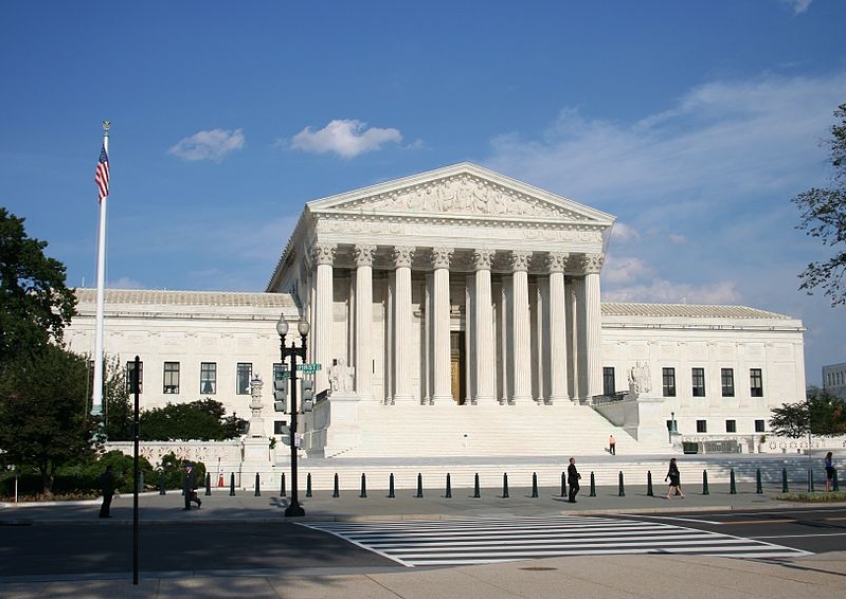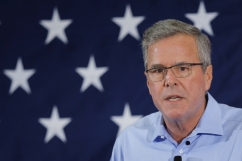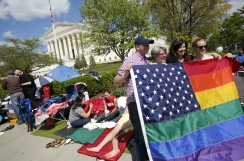
The nine US Supreme Court justices yesterday began to consider whether same-sex marriage should be a constitutional right, but American Christians are far from united on the issue.
Numerous prominent Christian leaders have signed the Defend Marriage pledge, which reads "We affirm that marriage and family have been inscribed by the Divine Architect into the order of Creation... The future of a free and healthy society passes through marriage and the family.
"As citizens united together, we will not stand by while the destruction of the institution of marriage unfolds in this nation we love. The effort to redefine marriage threatens the essential foundation of the family."
The signatories to the pledge include potential presidential candidates Senator Rick Santorum and Governor Mike Huckabee, Archbishop Foley Beach of the Anglican Church in North America, pastor of Cornerstone Church John Haggee and Franklin Graham, CEO of Samaritan's Purse.
They go on to say that if same-sex marriage is provided for in law, it will "bring about an inevitable collision with religious freedom and conscience rights... We cannot and will not allow this to occur on our watch."
The pledge concludes: "As people of faith we pledge obedience to our Creator when the State directly conflicts with higher law. We respectfully warn the Supreme Court not to cross this line... Make no mistake about our resolve."
Mat Staver, the founder of Liberty Counsel, who co-drafted the pledge, told Fox News, that "We're sending a warning to the Supreme Court, and frankly any court that crosses the line on the issue of marriage."
He added that if same-sex marriage were given legal protection it would result in the "beginning of the end of Western Civilization."
But the fact that they feel the need to defend their view so forcefully is perhaps indicative of the sense of growing opposition to their stance, both within the church and without.
About a decade ago, American Christians were more united in their opposition to same-sex marriage, but the latest data from the American Values Atlas from the Public Religion Research Institute shows a broad range of opinions.
While White evangelical Protestants remain largely opposed – 66 per cent either oppose or strongly oppose, among white mainline Protestants the opinion goes the other way, with 62 per cent either in favour or strongly in favour of gay marriage. Among the black Protestants surveyed 54 per cent were against gay marriage, but 60 per cent of Catholics said they were in favour, despite the Church's official stance. Nationally, 54 per cent of Americans are in favour of same-sex marriage.
This spread of feeling is reflected in those campaigning outside the court yesterday. People demonstrating both for and against use God as their argument. One person held a sign saying "Love is patient, love is kind, love perseveres," and another with the words "God loves gays". Nearby, others held signs saying "A child needs a mother and a father".
The oral arguments yesterday concentrated on two points: whether states can ban same-sex marriage, and whether a state that does not recognise gay marriage has a responsibility to recognise a couple who were legally married in a different state. Other crucial issues which will surface time and again are the definition of marriage and the parental rights of homosexual couples.
The nine justices generally reflected the split in public opinion, but much attention is focussed on Justice Anthony Kennedy, who holds the swing vote, and on Chief Justice John G Roberts. Yesterday Justice Kennedy seemed to be uncertain of his position, despite having made a number of crucial judgements in support of gay rights in the past. "This definition [of marriage] has been with us for millennia," he said. "And it's very difficult for the court to say 'Oh, well, we know better.'"
As when this issue was debated in the British parliament in 2013, the arguments around the nature of marriage were split into the historic definition of marriage and the outworking of the law in the current context. So far, 37 states have legalised same-sex marriage, either by court decision, state legislature or popular vote. The Supreme Court is expected to reach a decision in June.

















